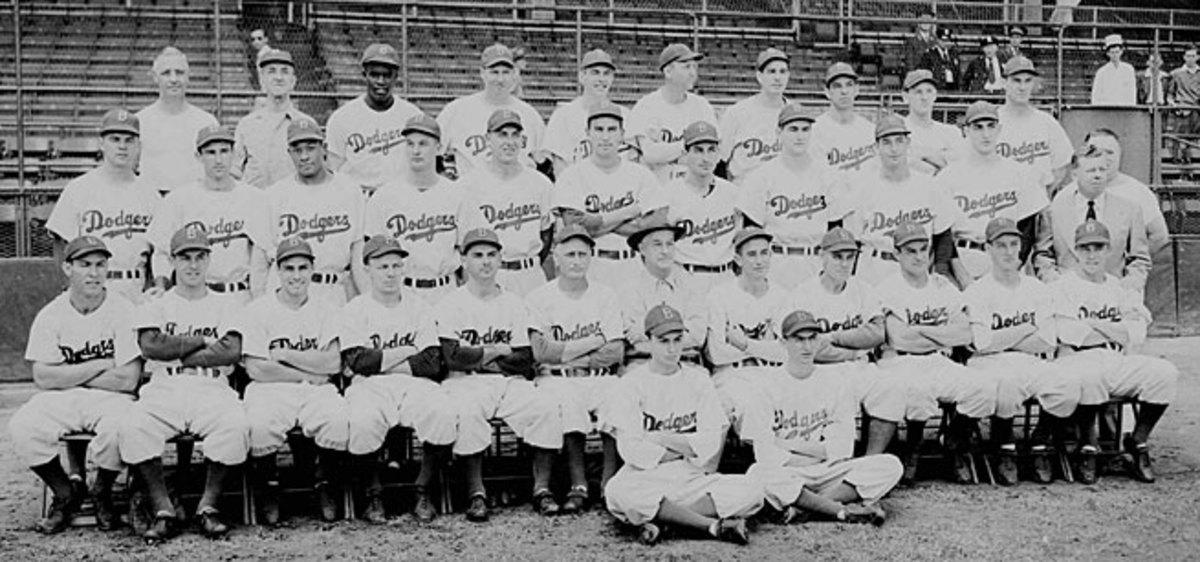Berman, ballboy for 1947 Dodgers, remembers Jackie Robinson


It took Norman Berman years to understand the significance of the situation he found himself in in the summer of 1947. He was much too concerned with his job hanging up umpires' uniforms and rubbing baseballs with Mississippi mud as the Dodgers' ball boy to consider that he was watching history play out right in front of him.
"I didn't realize it then," he says. "I get chills now when I think about how lucky I was to be there."
He knew he was lucky at the time, of course, but only to have the job at all -- "You want me to be the ball boy of the Brooklyn Dodgers? How much do I have to pay you?" he remembers thinking after he got the telegram inviting him to stop by Ebbets Field and speak with clubhouse manager John Griffin.
Berman, who was 19 that season and is now 84, is one of the few people still alive who was on the inside with that team. He had gone to Dodgers spring training to try out for one of their minor league teams, but at 5-foot-10 and 135 pounds, he couldn't hit much. The team sent him north with a pass to work out with the Dodgers whenever they were in town, near his home in Borough Park, and instructions to gain 10 pounds and try again next season. During one of his workouts in April he ran into Dodgers staffer Clyde Sukeforth, who had cut him, and pleaded his case one more time, telling him, "You need a good Jewish ballplayer on the Brooklyn Dodgers".
"Maybe we can find a job for you," Sukeforth suggested.
As it turned out, the original ball boy had just been fired for stealing baseballs. The Dodgers offered Berman $7 a game and let him keep working out with the team, but it took him three or four weeks to feel comfortable warming up on the field with the players. He tried to stay out of the way most of the time, not wanting "to get in front of anyone who was higher up," he says.
One day he saw Jackie Robinson standing alone.
"He had a glove in his hand and he had a ball and he was by himself flipping the ball up to get his rhythm," Berman remembers. "I said, 'Could we have a catch, Jackie?'"
Berman was a middle infielder, so although Robinson was playing first base that year, he was eager to soak up anything he could from the natural second baseman. Berman would warm up with anyone who would throw with him, and he would pepper the players with questions about how they had approached recent games. "I'd ask them, How come you did this instead of that, and they would explain it," he says. Robinson talked to him especially about how to make the pivot on the double play.
Berman didn't join the team as ball boy until May, so he missed the team's initial response to baseball's first black player, but things were noticeably chilly even a month in.
"It took awhile, of course," he says. "They didn't jell as much as he'd liked to have jelled. They weren't close to him like they were in July."
Berman's Brooklyn neighborhood was fairly diverse and he had played sandlot baseball with two of his black neighbors, so although Robinson's presence was notable, he wasn't exactly foreign. Berman was disappointed to learn that not everyone felt the same way -- including his favorite player, rightfielder Dixie Walker, who had played eight years in Brooklyn but was born in Georgia.
"Unfortunately he almost got those guys to not want to play with [Robinson]," he says softly. "He was good after awhile though."
Shortstop Pee Wee Reese, on the other hand, accepted Robinson. As for the famous episode in which, at a particularly difficult moment during a game at Cincinnati, Reese walked over to Robinson and put his arm around him, Berman remembers the effect more clearly than the incident itself.
"Pee Wee Reese led the team," he says. "People who are in the limelight have to show an example that you're a good human being, because kids copy you."
That was a lesson, Berman says, that Robinson never forgot. "He was a brilliant man, a college graduate," he says, and although Robinson in fact left UCLA just before graduation to earn money for his family, on a team where pitcher Ralph Branca was the only other regular to have attended a four-year college, that counted for a lot. "He knew that if he did anything wrong, there wouldn't be anyone following him. He gave the other black guys a chance."
KENNEDY: Rachel Robinson reflects life with her husband Jackie
SHEEHAN: Despite strengths, movie about Robinson falls flat
GRAHAM: A Q&A with Harrison Ford on portraying Branch Rickey in 42
